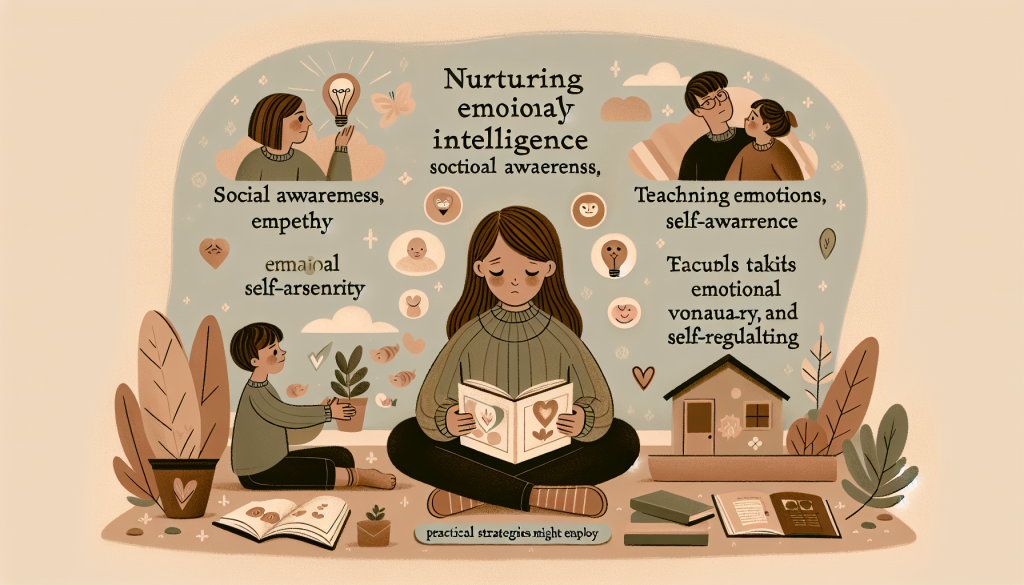“`html
Raising Emotionally Intelligent Children: A Guide for Parents
Support your child’s growth with empathy, social awareness, and emotional intelligence.
Introduction: Why Emotional Intelligence Matters
Have you ever wondered why some children seem to easily connect with others, handle challenges with resilience, and express their emotions in a healthy way? These children likely have a strong foundation in emotional intelligence. In today’s fast-paced world, raising emotionally intelligent kids is more important than ever. Emotional intelligence not only helps children navigate their feelings but also fosters positive relationships, boosts academic success, and builds lifelong skills for well-being.
As parents, we play a crucial role in shaping our children’s emotional and social abilities. But how can we nurture these skills in our kids? This article will explore the key components of emotional intelligence, provide insights into empathy development and social awareness, and offer practical strategies to help your child thrive.
Understanding Emotional Intelligence in Kids
Emotional intelligence (EI) refers to the ability to recognize, understand, and manage one’s own emotions while also being able to empathize with others. For children, developing EI lays the groundwork for healthy relationships, effective communication, and emotional resilience.
The Core Components of Emotional Intelligence
- Self-awareness: Recognizing and understanding one’s emotions, strengths, and weaknesses.
- Self-regulation: Managing emotions, controlling impulses, and adapting to changing circumstances.
- Empathy: Understanding and sharing the feelings of others.
- Social skills: Building and maintaining positive relationships.
Studies show that children with high emotional intelligence are better equipped to handle challenges, whether they’re on the playground, in the classroom, or at home. According to psychologists, these skills can be taught and nurtured, much like academic or physical skills.
How to Foster Empathy Development and Social Awareness
Empathy and social awareness are at the heart of emotional intelligence. Teaching kids to understand and respect others’ feelings is essential for their personal growth and for fostering a kinder, more connected world.
1. Model Empathy in Your Own Behavior
Children learn by observing the adults around them. When you express empathy toward others—whether it’s a friend, a stranger, or your child—you’re showing them how to respond with understanding. For example, if your child is upset about a lost toy, acknowledge their feelings: “I see you’re really sad about losing your toy. That must feel hard.” This validates their emotions and teaches them to do the same for others.
2. Encourage Perspective-Taking
Help your child see situations from another person’s point of view. Ask questions like, “How do you think your friend felt when you shared your toy with them?” or “What do you think your teacher might feel when students listen carefully?” These prompts build their capacity for empathy.
3. Use Books and Stories to Teach Emotions
Reading stories together is a powerful way to teach emotional intelligence. Choose books where characters face emotional challenges, and pause to discuss how they might be feeling. This not only builds empathy but also improves social awareness by helping kids understand different perspectives.
Practical Recommendations for Parents
1. Create a Safe Emotional Space
Children need to feel safe and supported to express their emotions. Encourage open communication by letting them know it’s okay to talk about how they’re feeling, even when emotions are big or uncomfortable. For example, instead of dismissing a tantrum, try saying, “I see that you’re feeling frustrated. Let’s talk about it.” This meets their psychological need for safety and expression.
2. Teach Emotional Vocabulary
Give your child the tools to articulate their feelings by teaching them a broad emotional vocabulary. Instead of just saying “happy” or “sad,” introduce words like “disappointed,” “excited,” or “nervous.” This helps them better understand and communicate their emotions.
3. Practice Mindfulness Together
Mindfulness exercises, such as deep breathing or guided imagery, can help children regulate their emotions. Practice these techniques together as a family to create a calming routine. For example, you can try a simple breathing exercise: “Let’s take a deep breath in for four counts, hold for four counts, and breathe out for four counts.”
4. Use Positive Reinforcement
When your child demonstrates emotional intelligence, acknowledge and celebrate it. For instance, if they show kindness to a sibling, say, “I’m so proud of how you helped your brother when he was upset.” Positive reinforcement encourages them to repeat these behaviors.
5. Set Age-Appropriate Boundaries
Teaching emotional intelligence doesn’t mean eliminating rules. Setting consistent, age-appropriate boundaries helps children feel secure and teaches them how to manage frustration. For example, explain why certain rules exist: “We use gentle hands because hitting hurts others.”
Conclusion: The Lifelong Impact of Emotional Intelligence
Raising emotionally intelligent kids is one of the most valuable gifts you can give as a parent. By fostering empathy, teaching emotional awareness, and providing a safe space for expression, you’re equipping your child with the skills they need to navigate life’s challenges confidently and compassionately.
Remember, emotional intelligence is not about being perfect—it’s about progress. Every small step you take to nurture these skills in your child will have a lasting impact on their relationships, academic success, and overall well-being.
For more tips and resources on parenting and child development, explore our other articles on Child Mind.
“`

